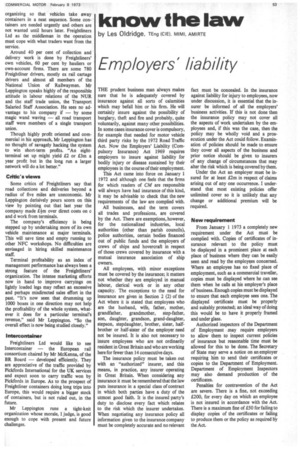know the law
Page 55

If you've noticed an error in this article please click here to report it so we can fix it.
by Les Oldridge, TEng {CIE), MIMI, AIVIIRTE
Employers' liability
THE prudent business man always makes sure that he is adequately covered by insurance against all sorts of calamities which may befall him or his firm. He will certainly insure against the possibility of burglary, theft and fire and probably, quite voluntarily, against many other possibilities. In some cases insurance cover is compulsory, for example that needed for motor vehicle third party risks by the 1972 Road Traffic Act. Now the Employers' Liability (Compulsory Insurance) Act 1969 requires employers to insure against liability for bodily injury or disease sustained by their employees in the course of their employment.
This Act came into force on January I 1972 and although one feels that the firms for which readers of CM are responsible will always have had insurance of this kind, it may be advisable to check that the new requirements of the law are complied with.
All businesses, and the term covers all trades and professions, are covered by the Act. There are exemptions, however, for the nationalized industries, local authorities (other than parish councils), police authorities, certain bodies financed out of public funds and the employers of crews of ships and hovercraft in respect of those crews covered by insurance with a mutual insurance association of ship owners.
All employees, with minor exceptions must be covered by the insurance; it matters not whether they are employed in manual labour, clerical work or in any other capacity. The exceptions to the need for insurance are given in Section 2 (2) of the Act where it is stated that employees who are the husband, wife, father, mother, grandfather, grandmother, step-father, son, daughter, grandson, grand-daughter, stepson, stepdaughter, brother, sister, halfbrother or half-sister of the employer need not be insured. It is also not necessary to insure employees who are not ordinarily resident in Great Britain and who are working here for fewer than 14 consecutive days.
The insurance policy must be taken out with an "authorized" insurer, and this means, in practice, any insurer operating• in Great Britain. When considering any insurance it must be remembered that the law puts insurance in a special class of contract in which both parties have a duty of the utmost good faith. It is the insured party's duty to disclose every fact which relates to the risk which the insurer undertakes. When negotiating any insurance policy all information given to the insurance company must be completely accurate and no relevant fact must be concealed. In the insurance against liability for injury to employees, now under discussion, it is essential that the insurer be informed of .all the employers' business activities. If this is not done then the insurance policy may not cover all the aspects of work undertaken by the employees and, if this was the case, then the policy may be wholly void and a prosecution under the Act could follow. Examination of policies should be made to ensure they cover all aspects of the business and prior notice should be given to insurers of any change of circumstances that may alter the risk which is being covered by them.
Under the Act an employer must be insured for at least £2m in respect of claims arising out of any one occurrence. I understand that most existing policies offer unlimited cover so it is unlikely that any change or additional premium will be required.
New requirement From January 1 1973 a completely new requirement under the Act must be complied with. Copies of certificates of insurance relevant to the policy must be displayed in a prominent place at each place of business where they can be easily seen and read by the employees concerned. Where an employee has no fixed place of employment, such as a commercial traveller, copies must be displayed where he can see them when he calls at his employer's place of business. Enough copies must be displayed to ensure that each employee sees one. The displayed certificate must be properly and suitably protected; an ideal way of doing this would be to have it properly framed and under glass.
Authorized inspectors of the Department of Employment may require employers to allow them to inspect current policies of insurance but reasonable time must be allowed for this to be done. The Secretary of State may serve a notice on an employer requiring him to send their certificates or copies to the Department of Employment. Department of Employment Inspectors may also demand production of the certificates.
Penalties for contravention of the Act are severe. There is a fine, not exceeding £200, for every day on which an employee is not insured in accordance with the Act. There is a maximum fine of £50 for failing to display copies of the certificates or failing to produce them or the policy as required ly the Act.
































































































